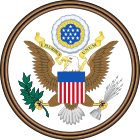Teller Amendment facts for kids
 |
|
| Long title | Joint Resolution For the recognition of the independence of the people of Cuba, demanding that the Government of Spain relinquish its authority and government in the Island of Cuba, and to withdraw its land and naval forces from Cuba and Cuban waters, and directing the President of the United States to use the land and naval forces of the United States to carry these resolutions into effect. |
|---|---|
| Enacted by | the 55th United States Congress |
| Effective | April 20, 1898 |
| Citations | |
| Statutes at Large | 30 Stat. 738, Resolution 24 |
| Legislative history | |
|
|
The Teller Amendment was an important addition to a law passed by the United States Congress. It was approved on April 20, 1898. This amendment was a response to a message from President William McKinley about going to war.
The Teller Amendment set a clear rule for the United States military in Cuba. It stated that the U.S. could not take over Cuba. Instead, the U.S. would help Cuba become independent. After Cuba gained its freedom, the U.S. promised to remove all its troops.
Why the U.S. Got Involved
Cuba was fighting for its freedom from Spain. This struggle created a lot of tension in the U.S. On February 15, 1898, a U.S. Navy ship called the USS Maine sank in Havana harbor. This event made many Americans want to help Cuba even more.
On April 11, 1898, President William McKinley asked Congress for permission to act. He wanted to end the fighting between Spain and Cuba. He also wanted to help Cuba set up a stable government. This government would need to keep order and follow international rules. President McKinley asked to use the U.S. military to achieve these goals.
What the Teller Amendment Did
Senator Henry M. Teller from Colorado suggested this amendment. He was a Republican who had changed parties earlier. He wanted to make sure the U.S. would not keep control of Cuba after the war with Spain ended.
Some members of Congress worried that President McKinley might try to take over Cuba. This was because the U.S. government was not sure about recognizing Cuba's rebel government. The Teller Amendment helped calm these fears. It clearly stated that the United States:
- Did not plan to rule or control Cuba.
- Would only get involved to bring peace to the island.
- Would leave Cuba's government and control to its own people once peace was achieved.
The Teller Amendment received support from different groups. Some people did not want to add new territories with many Black and Catholic citizens. Others truly believed in Cuba's independence. Also, some U.S. sugar businesses, including Senator Teller, worried about competition from Cuban sugar. If Cuba became a U.S. territory, tariffs (taxes) on its sugar imports would be removed. This would make Cuban sugar cheaper and hurt U.S. sugar growers.
The Senate approved the amendment by a voice vote. Then, the Senate passed the main resolution with the amendment by a vote of 42 to 35 on April 19, 1898. The House of Representatives agreed on the same day, with 311 votes for and 6 against. President McKinley signed the resolution into law on April 20, 1898. The U.S. then sent its demands to Spain.
After the War
The Spanish-American War lasted from April 25 to August 12, 1898. It ended with the Treaty of Paris on December 10, 1898. As a result, Spain lost control of its remaining colonies. These included Cuba, Puerto Rico, the Philippine islands, and Guam.
After Spanish troops left Cuba in December 1898, the United States occupied the island. This occupation lasted until 1902. As promised by the Teller Amendment, the U.S. did not try to take over Cuba.
However, a new law called the Platt Amendment was created in 1901. This amendment replaced the Teller Amendment. It gave the United States the right to interfere in Cuba's important decisions. This meant that Cuba's government was still partly controlled by the U.S. This situation caused some bad feelings toward the United States in Cuba.
According to Gregory Weeks, an author, Senator Henry Teller wanted to protect his state's beet sugar crop. He wanted to make sure that Cuban sugar would not compete with it. This was one reason he wrote the amendment that stopped the U.S. from taking over Cuba.
 | Kyle Baker |
 | Joseph Yoakum |
 | Laura Wheeler Waring |
 | Henry Ossawa Tanner |

